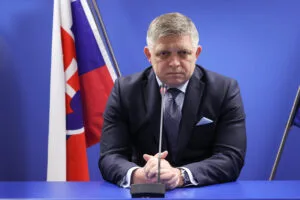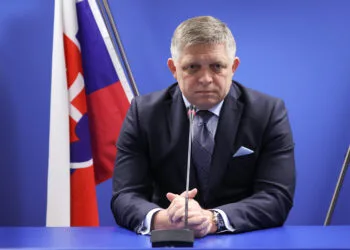Brussels – Exactly three weeks after the assassination attempt that seriously threatened to cost him his life, Slovakia’s prime minister, Robert Fico, is back. And those who feared a possible angry and liberticidal reaction to Slovakia’s future had a point. “On May 15, a Slovak opposition activist tried to assassinate me in Handlová because of my political views,” Fico began in his first appearance since the attempted assassination, in a 14-minute video posted on Facebook that targeted the liberal opposition, “foreign-funded” non-governmental organizations, and the “anti-government media,” even bringing up businessman and philanthropist George Soros.

In his message to Slovak citizens, Fico dismissed the suggestion of an attack at the hands of “a lone lunatic,” even going so far as to forgive him because “it is clear that he was only a harbinger of evil and political hatred, which the politically bankrupt and frustrated opposition has developed in Slovakia to unmanageable proportions.” If all parties in the country had agreed to suspend the escalation of verbal violence during the European election campaign not to increase the risk of more attacks, the Prime Minister broke this promise on the last day before the election silence. . Announcing that he will be able to return to work as head of the cabinet “gradually at the turn of June and July,” Fico explicitly targeted the opposition led at the polls last year by former vice-president of the EU Parliament, Michal Šimečka: “If it continues like this, the horror of May 15 will continue, and there will be more victims. I don’t doubt it for a second.”
The Slovak premier also did not spare an attack on what he considers the “anti-government media, especially those who are co-owners of George Soros‘s financial structure,” for “downplaying” what happened in Handlová. In truth, no media in Slovakia has attempted to justify or gloss over the seriousness of the act carried out by a man of dubious political affiliation, nor did opposition parties shy away from distancing themselves from any connection with the attacker. Fico’s words – which came to say the least with unusual timing in the run-up to the European elections in Slovakia on June 8 -seem much more an attempt to incite a section of the undecided electorate to vote for his populist Smer-Ssd party and scuttle Šimečka’s Progressive Party, which according to polls is paired with the ruling party between 21 and 23 percent of voting intentions. “I am happy that Fico is feeling better. Unfortunately, nothing has changed in his politics,” the Prime Minister’s main political opponent commented laconically. Smer-Ssd is also seeking strong electoral affirmation to accredit itself as a key interlocutor in the formation of a new far-left red-brown group in the EU Parliament.
The red-brown Slovakia of Fico and Pellegrini
In addition to the June 8 European elections in Slovakia, the swearing-in of the new president of the republic, Peter Pellegrini, is also expected on June 15, with the April 6 election sealing the red-brown national-populist turn in the EU member country. It all started with the September 30, 2023, legislative elections, when the Smer-Ssd Social Democrats emerged as the leading force in Parliament, followed by the Šimečka’s Progressive Party and the Hlas-Sd Social Democrats. Pellegrini’s 27 deputies were instrumental in forming a majority with the two pro-Russian forces – the Smer Social Democrats and the extreme right-wing Slovak National Party – even though the party leader had assured that “with our presence, we will ensure that Slovakia’s membership in the EU and NATO will not be jeopardized.”

The decision to start a pro-Moscow government also had consequences at the European level. On October 12, the Chair of the Party of European Socialism (Pes) decided to suspend membership of the Slovak Smer-Ssd and Hlas-Sd parties, and the Group of the Progressive Alliance of Socialists and Democrats in the European Parliament opted to suspend the membership of the three Slovak MEPs due to concerns over policies on the merits of Russia’s war against Ukraine, migration, the rule of law, and the rights of the Lgbtq+ community. All this has been compounded since the beginning of the year by a wave of protests for the go-ahead for the reform of the Criminal Code, which provides for the abbreviation of the statute of limitations for the most serious crimes – from 20 to 5 years – and the abolition of the office of the special prosecutor dealing with crimes such as those related to organized crime and high-level corruption. The opposition claims it is an attempt to weaken the judiciary – in favor of Fico’s party members and supporters of the high-level government – in a country where the current Prime Minister had to resign in 2018 following the murder of journalist Ján Kuciak and his girlfriend Martina Kušnírová, who had exposed links between the ‘ndrangheta and the Slovak elite (including members of his Smer party).
The reform of the Criminal Code could open a clash with Brussels similar to the one in Hungary that led to activating the conditionality mechanism on the rule of law. At the time of the presentation of the draft, the EU Commission, the European Public Prosecutor’s Office (Eppo), and the EU Parliament warned Bratislava that changes to the Criminal Code could “seriously” compromise the level of protection of the EU’s financial interests in Slovakia, specifically in the area of corruption, fraud, and mismanagement of EU funds. In this scenario, countermeasures in Brussels would be inevitable. With its entry into force on March 15–with some slight modifications to meet the objections of the three EU institutions–the Commission is being called upon to assess the reform as a whole and decide whether there are still concerns that warrant action ranging from infringement proceedings to activation of the rule of law conditionality mechanism.
English version by the Translation Service of Withub






![Isabel Vansteenkiste (sinistra) sarà la nuova consigliera particolare della presidente della Bce, Christine Lagarade (destra).
[foto: European Central Bank; Wikimedia Commons]](https://www.eunews.it/wp-content/uploads/2025/07/vandlagar-120x86.png)

